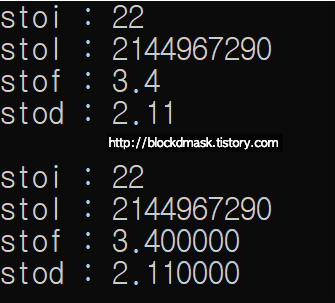문자열
[C++] 문자열 인코딩 (유니코드 멀티바이트 UTF-8 변환)
유니코드 > 멀티바이트 wchar_t strUnicode[256] = {0,}; charstrMultibyte[256] = {0,}; wcscpy_s(strUnicode,256,L"유니코드"); int len = WideCharToMultiByte( CP_ACP, 0, strUnicode, -1, NULL, 0, NULL, NULL ); WideCharToMultiByte( CP_ACP, 0, strUnicode, -1, strMultibyte, len, NULL, NULL ); stl 이용 wstring strUni = L"유니코드"; int len = WideCharToMultiByte( CP_ACP, 0, &strUni[0], -1, NULL, 0, NULL, NULL ); string strMul..

[JS] 문자열(String) 객체 정리 (속성 및 메소드)
1. 문자열 객체 생성 및 초기화 var 참조변수 = new String(문자열 데이터) var 참조변수 = 문자열 데이터 ▼ 문자열 객체를 선언하는 방식은 두 가지가 있다. 첫 번째는 new 연산자를 통해 String 객체를 생성하면서 생성자 정보로 문자열 데이터를 넘기는 방식과 new 연산자를 사용하지 않고 선언한 참조 변수에 문자열 데이터를 입력하여 객체를 생성하는 방식이 있다. 2. 문자열 함수 - charAt() 자바스크립트(JavaScript)에서는 문자형 데이터를 객체화한 String 객체를 제공함으로써 그 안에 내장되어있는 속성 및 함수를 통해 다양한 기능을 제공하고 있다. charAt() 함수는 문자열에서 인자로 넘긴 index에 해당하는 문자형 데이터를 반환해주는 함수이다. ▼ Samp..

[C++] string(문자열) 클래스 변환(atoi, c_str()) 등 정리
1) 함수 설명 int atoi(const char* str) 헤더파일(C) : 헤더파일(CPP) : 설명 : C style의 문자열을 입력받아서 int (숫자) 타입으로 변환하여 리턴한다. std::string c_str() 반환형이 char * 이므로, 해당하는 string의 첫번재 문자의 주소값(포인터)를 반환한다. 예제 헤더파일 : , , 이름공간 : using namespace std; char* > string char * cStr = "Cstring"; string cppStr = cStr; cout

[C++] stoi, stof, stol, stod 함수에 대해서 (string to int), 문자열 > 특정 타입
1. C++에서 string 타입의 문자열을 숫자로 바꾸는 함수들의 이름. ▼ C++11 부터 아래 함수들을 사용할 수 있다. stoi = string to int stof = string to float stol = string to long stod = string to double stoul = string to unsigned int stoll = string to long long stoull = string to unsigned long long stold = string to long double 2. C++ stoi, stof, stol, stod 함수 원형과 매개변수가 뜻하는 것 ▼ 함수 원형 1) 정수형 int stoi(const string& str, size_t* idx = 0, i..

[C++] to_string 함수에 대해서, 특정 타입 > 문자열
1. std::to_string 함수 원형과 함수 설명 ▼ std::to_string 헤더파일 ▼ std::to_string 함수 원형 string to_string (int num); string to_string (long num); string to_string (long long num); string to_string (unsigned num); string to_string (unsigned long num); string to_string (unsigned long long num); string to_string (float num); string to_string (double num); string to_string (long double num); ▼ std::to_string 함수 ..
C# 문자열 배열을 int 배열로 변환
1. Array.ConvertAll() 메서드를 사용 using System; using System.Collections.Generic; using System.Linq; using System.Text; using System.Threading.Tasks; using System.Linq; namespace Array_of_String_to_integer { class Program { static void Main(string[] args) { //method 1 using Array.ConvertAll string[] temp_str = new string[] { "1000", "2000", "3000" }; int[] temp_int = Array.ConvertAll(temp_str, s => ..

C# 문자열 자르기(Split), 추출(Substring)
Split 메서드 문자열을 특정 문자 또는 문자열을 기준으로 분리한다. 분리된 문자열은 배열로 반환되며, 전화번호에서 '-'를 기준으로 문자열을 분리하거나 이메일에서 '@'를 기준으로 문자열을 분리하는 경우 사용할 수 있다. string phoneNumber = "010-1234-5678"; string[] phoneNumberSplit = phoneNumber.Split("-"); foreach(string splitNumber in phoneNumberSplit) { Console.WriteLine(splitNumber); } "-"을 기준으로 문자열을 분리하였으며, 분리된 문자열은 배열로 반환한다. 즉, 배열 phoneNumberSplit에는 [ "010", "1234", "5678" ]이 할당된다..
C# 문자열 공백 기준으로 분할
String.Split() 방법. 구분 기호를 지정하지 않으면 공백 문자로 문자열을 분할한다. using System; public class Example { public static void Main() { String s = "Split by\twhitespace"; string[] tokens = s.Split(); Console.WriteLine(String.Join(", ", tokens)); // 공백으로 분할 } } 여러 공간을 처리하려면 다음을 사용할 수 있다. String.Split(char[]) method 과부하 StringSplitOptions.RemoveEmptyEntries 아래 그림과 같이 옵션을 선택. using System; public class Example { pub..
C# string.format, 문자열 보간($)을 이용한 문자열 출력 방법
1. C# string 출력 방법 : 기본 출력 //직접 Console.WriteLine("BlockDMask1"); //변수 이용 string str2 = "BlockDMask2"; Console.WriteLine(str2); 2. C# string 출력 방법2 : Format() 메소드 //format 이용 방법1 Console.WriteLine("Example1 : {0}, {1}", "BlockDMask", 1212); //format 이용 방법2 int num = 999; string str1 = string.Format("Example2 : {0}, {1}, {2}", "BlockDMask", 3434, num); 3. C# string 출력 방법3 : 문자열 보간 //문자열 보간 이용 방법 ..
[실4] 1120 - 문자열
#include #include #include using namespace std; int main() { string a, b; cin >> a >> b; int aLength = a.size(), bLength = b.size(); int res = INT_MAX; for (int i = 0; i